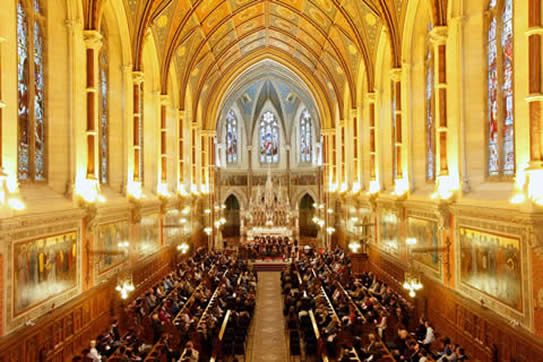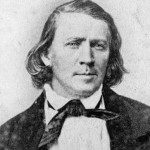
First, though: The discussants for the 18 June 2023 episode of the Interpreter Radio Show were Bruce Webster, Kris Frederickson, and Robert Boylan. During the two-hour program, they discussed Come, Follow Me New Testament lesson 29, the Restoration of the Melchizedek Priesthood, the Mormon History Association Conference, and the Religious Freedom Annual Review.
Their conversation has now been archived, freed from commercial and other interruptions, and made available to you at your convenience and free of charge. The “New Testament in Context” portion of this show, for the Come, Follow Me New Testament lesson 29, “What Wilt Thou Have Me to Do?,” covering Acts 6–9, will also be posted . . . on Tuesday, 4 July 2023.
The Interpreter Radio Show can be heard live on Sunday evenings from 7 to 9 PM (MDT), on K-TALK, AM 1640. Or, if you live out of the area or prefer you can listen live on the Internet at ktalkmedia.com.

I want to share a few passages from Logan Paul Gage, “Understanding Design Arguments,” in Ann Gauger, ed., God’s Grandeur: The Catholic Case for Intelligent Design (Manchester, NH: Sophia Institute Press, 2023), 20-31. Logan Paul Gage, who earned his doctorate in philosophy at Baylor University, chairs the Department of Philosophy at the Franciscan University of Steubenville. Ann Gauger, the overall editor of the volume in which Professor Gage’s article appears, is Director of Science Communication and a Senior Fellow at the Discovery Institute Center for Science and Culture, and Senior Research Scientist at the Biologic Institute in Seattle, Washington. She received her bachelor’s degree from the Massachusetts Institute of Technology and her Ph.D. from the University of Washington Department of Zoology. She held a postdoctoral fellowship at Harvard University, where her work focused on the molecular motor kinesin. She serves as an editor of the journal BIO-Complexity, and her scientific work has been published in Nature, Development, Journal of Biological Chemistry, Genetic Regulation of Development, In Vitro, In Vitro Cell and Developmental Biology, BIO-Complexity, and Biological Information: New Perspectives.
On to Professor Gage, who, I think, offers some helpful clarification:
[I]ntelligent design (ID) proponents typically define intelligent design as the view that certain features of the universe and of living things are best explained by an intelligent cause rather than an undirected process. Note that this doesn’t mean that no evolution has occurred, or that natural processes and forces don’t have their place. It is rather the minimal claim that it’s not natural processes and forces all the way down—a claim to which we Catholics are dogmatically committed, believing as we do that all things originate in God. (22)
It seems to me that Latter-day Saints, too, are inescapably committed in at least the most basic sense to a form of intelligent design. That doesn’t necessarily entail a rejection of evolution, though, and it certainly doesn’t require us to deny natural laws and ordinary processes of cause and effect. But the creation texts of Genesis, Moses, Abraham, and, yes, the temple unmistakably teach that God intended to create the world we know, that there was mind and conscious divine purpose from the very beginning. And I think in particular of this scriptural text — along with others that could be cited — which could scarcely be any plainer than it is:
We will go down, for there is space there, and we will take of these materials, and we will make an earth whereon these may dwell; and we will prove them herewith, to see if they will do all things whatsoever the Lord their God shall command them. (Abraham 3:24-25)
Back, though, to Logan Paul Gage:
Design proponents have made arguments for real rather than apparent design at different levels. For instance, they’ve argued that the beginning of the universe requires an intelligent cause (William Lane Craig and James Sinclair), that the laws of physics are designed (Robin Collins), that our planet is uniquely designed (Guillermo Gonzalez and Jay W. Richards), that chemistry as we know it is designed for life (Michael Denton; Benjamin Wiker and Jonathan Witt), that the building blocks of living things cannot be found by blind searches but must be designed (Douglas Axe), that the first living creature and the fossil record give evidence of design (Stephen Meyer), and that both macro-and micro-features of living things give evidence of intelligent design (Michael Denton; Michael Behe).
Note three quick things about these arguments. First, contrary to stereotypes, these arguments are not “god-of-the-gaps” arguments. None of these arguments claims, “I don’t know what caused this, so God musta done it.” Rather, the standard mode of argumentation for design proponents is an inference to the best explanation—a common form of reasoning in general and in the historical sciences (like evolutionary biology) in particular. They argue that there are positive signs of intentional design in nature and that non-intentional explanations are weak by comparison. (22-23)
[T]hese arguments have clear theological implications, but ID proponents attempt to stick to the publicly available scientific evidence and do not argue from religious texts. Most intelligent design proponents are Christians, but an argument that the designer is the Christian God would require more than just the scientific evidence. ID proponents are not being coy about their belief in God but being careful about their conclusions. Aquinas does the same thing. (23)
Strikingly, more than a few Catholic and Protestant (and Latter-day Saint) scientists and intellectuals reject intelligent design. In at least some cases, though, I suspect that they haven’t really engaged with it and may perhaps have misconceptions about it — certainly, in my experience that has not infrequently been the case — although there is surely room for questioning this or that specific ID argument. Says Professor Gage,
Many Catholic intellectuals labor under the false impression that intelligent design theorists propose a false dilemma: either there is an intelligent designer or else natural laws are responsible for these designed-looking features of our world—as though God cannot be responsible for the natural laws themselves or that natural causes cannot be instruments of God (i.e., secondary causes). 15 This would indeed be an unfortunate dilemma. Fortunately, this is a misunderstanding. ID does not imply a zero-sum game where if God is responsible for something then He must act directly and nature cannot be a true cause as well. Rather, the minimal claim is only that some features of our world give very good evidence of having been intelligently designed somewhere in their origin story. What ID denies is that every feature of nature is the product of natural forces all the way down. Given that this commitment is necessarily shared by Catholics, Catholic hostility to ID on this point is surprising, to put it mildly.
The only thing that can’t be the case . . . is that God intends to create by truly accidental or unguided events, for that involves a logical contradiction: God can’t guide an unguided process.













